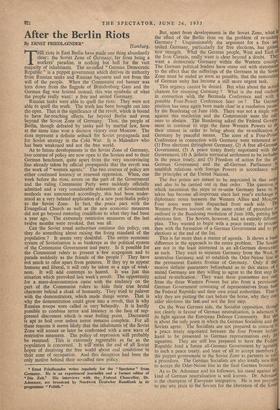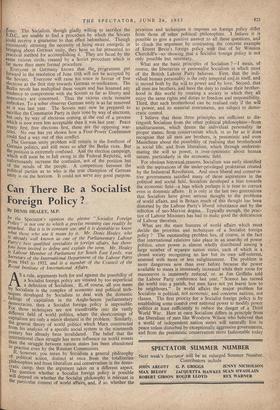After the Berlin Riots
By ERNST FRTEDLAENDER*
Hamburg.
THE riots in East Berlin have made one thing abundantly clear: the Soviet Zone of Germany, far from being a workers' paradise, is nothing but hell for the vast majority of inhabitants. The so-called " German Democratic Republic " is a puppet government which derives its authority from Russian tanks and Russian bayonets and not from the will of the people. When the Communist red banner was torn down from the flagpole of Brandenburg Gate and the German flag was hoisted instead, this was symbolic of what the people really want: a free and united Germany.
Russian tanks were able to quell the riots. They were not able to quell the truth. The truth has been brought out into the open. That is the significance of the revolt, which is bound to have far-reaching effects, far beyond Berlin and even beyond the Soviet Zone of Germany. Thus, the people of Berlin, though defeated by tanks and by martial law, have at the same time won a decisive victory over Moscow. The riots represent a definite setback for Soviet propaganda and for Soviet strategy in the Cold War. It is Malenkov who has been weakened and not the free world.
As to future developments in the Soviet Zone of Germany, two courses of policy are now open to the Soviets and to their German henchmen, quite apart from the very unconvincing line already taken by official propaganda that the revolt was the work of " western agents." The two courses of policy are either continued leniency or renewed repression. When, one week before the riots, errors on the part of the Government and the ruling Communist Party were suddenly officially admitted and a very considerable relaxation of Sovietisation methods was announced accordingly, this had been under- stood as a very belated application of a new post-Stalin policy to the Soviet Zone. In fact, the peace pact with the Evangelical Church as well as the new economic measures did not go beyond restoring conditions to what they had been a year ago. The extremely restrictive measures of the last twelve months were revoked, that was all.
Cad the Soviet zonal authorities continue this policy, can they do something about raising the living standard of the population ? It seems very doubtful. The entire economic system of Sovietisation is as bankrupt as the political system of the Communist Government and party. Is it possible for the Communist rulers to present a few scapegoats and to parade suddenly as the friends of the people ? They have hot much to offer apart from gestures. If they try to appear humane and liberal, it will only be taken as a sign of weak- ness. It will add contempt to hatred. It was just this situation which provoked last week's revolt. The opportunity for a mass-demonstration came with the tendency on the part of the Communist rulers to hide their true brutal character behind a cloak of humanity. They tried to palaver with the demonstrators, which made things worse. That is why the demonstration could grow into a revolt, that is why Russian troops were called in very 'belatedly. It is hardly possible to combine terror and leniency in the face of sup- pressed discontent which is near boiling point. Discontent is apt to boil over unless terror remains complete. For all these reasons it seems likely that the inhabitants of the Soviet Zone will Sooner or later be confronted with a new wave of restrictive measures. The policy of repression will probably be resumed. This is extremely regrettable as far as the population is concerned. It will mean the end of all Soviet hopes of deceiving the free world about real conditions in their zone of occupation. And this deception had been the only motive behind their so-called new policy.
* Ernst Friedlaender writes regularly for the " Spectator " from Germany. He is an experienced journalist and a former editor of "Die Zeit." His interviews with the Federal Chancellor, Dr. Adenauer, are broadcast by Nordwest Deutscher Rundfunk in its programme "Politik."
But, apart from developments in the Soviet Zone, what 11 the effect of the Berlin riots on the problem of re-uniting Germany ? Unquestionably the argument for a free an united Germany, particularly for free elections, has gaine new strength. What the German people, West and East 0 the Iron Curtain, really want is clear beyond a doubt. The}' want a democratic Germany within the Western concept The German political leaders have come out with statement0 to the effect that the sufferings of the Germans in the Soviet Zone must be ended as soon as possible, that the restoration of German unity has become a still more urgent task. This urgency cannot be denied. But what about the actual chances for reuniting Germany ? What is the real outlool, in connection with the Bermuda Conference and with ° possible Four-Power Conference later on ? The German position has once again been made clear in a resolution passed by the Bundestag on June 10th. There was not a single vote against this resolution and the Communists were the ouli ones to abstain. The Bundestag asked the Federal Govera ment to continue to urge the three Western Powers to de their utmost in order to bring about the re-unification 01 Germany by peaceful means. The aims of a Four-Power Conference in connection with Germany were reiterated as! (1) Free elections throughout Germany, (2) A free all-German Government, (3) A peace treaty freely negotiated with that Government, (4) A definite territorial settlement to be included in the peace treaty, and (5) Freedom of action for the all' German Government and the all-German Parliament t°, establish relations with foreign Powers in accordance NO the principles of the United Nationi. The five points are meant to be negotiated in that order and also to be carried out in that order. The question it which succession the steps to 're-unite Germany have to 11 taken has become all-important since last year's exchange of diplomatic notes between the Western Allies and IVIoscov° Four notes were then dispatched from each side. Tile Western Powers insisted on the same order of procedure outlined in the Bundestag resolution of June 10th, putting fret elections first. The Soviets, however, had an entirely differell! plan. They wanted to begin with a peace treaty, to proceed then with the formation of a German Government and to put elections at the end of the list. This is far more than a matter of agenda. It shows a basic difference in the, approach to the entire problem. The Soviett are not in the least interested in an all-German democrad as such. They want to separate Germany from the West, in neutralise Germany and to establish the Oder-Neisse line 8 the permanent Eastern frontier of Germany. Only if thei receive definite guarantees beforehand as to this status of 0 united Germany are they willing to agree to the first step fot actual re-unification. They want these guarantees not ca, from the three Western Powers but also from a provisiona' German Government consisting of representatives from both the Federal Republic and their own zonal, authorities. That is why they are putting the cart before the horse, why they con' sider elections the last and not the first step. On the West German side, the Socialist opposition, thougii not clearly in favour of German neutralisation, is adamant ill its fight against the European Defence Community. But tli is about the only point in which the German Socialists and the Soviets agree. The Socialists are not prepared to consent to a peace treaty negotiated between the four Powers before' band to be presented to German representatives only for. l signature. They are still less prepared to have the Federal Republic bind a future all-German Government by agreelagi, to such a peace treaty, and least of all to accept members the puppet government in the Soviet Zone as partners in suo a procedure. The German Socialists are also totally unwilling to accept the Oder-Neisse line as the final German frontier. As to Dr. Adenauer and his followers, his stand against aa) kind of German neutralisation is well known. Dr. Adenauel, is the champion of European integration. He is not prepare° to pay any price to the Soviets for the liberation of the Sovie Zone. The Socialists, though gladly willing to Sacrifice the E.D.C., are unable to find a procedure by which the. Seviets Could receive a guarantee -to that effect beforehand: • Though consistently stressing the necessity of being more energetic in bringing about German unity, they have so far presented no practical method for acComplighing it. They are faced by the same vicious circle, created by a Soviet procedure which is far more than mere formal procedure. Everyone in Germany' knows 'that the,,,, programme put forward in the resolUtion of June 10th will not be accepted by the Soviets. Everyone will raise his voice in favour of free elections as the first step towards German re-unification. The Berlin revolt has multiplied these voices and has lessened any tendency to compromise with the Soviets as far as liberty and democracy are concerned. Thus the vicious circle remains unbroken. To a sober observer German unity is as far removed as it was last year. The Soviets may now be prepared to sacrifice the Communist Party in their zone by way of elections, but only by -way of elections coming at the end of a process which is now even less acceptable than it was last year. Peace treaty first, free elections first, 'these are the opposing war- cries. No one has yet shown how a Four-Power Conference could find a way out of this conflict. The German unity problem will remain in the forefront of German politics, and still more so after the Berlin riots. But the position is extremely confused. And the election campaign, which will soon be in full swing in the Federal Republic, will unfortunately, increase the confusion, not of the position but of the minds of the people. A competition between 'the Political parties as to who is the true champion of German unity is on the horizon. It could not serve any good purpose.



































 Previous page
Previous page